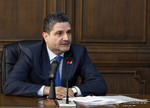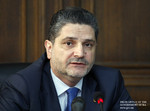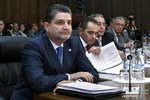Monday, 18 October 2010
Statement by Prime Minister Tigran Sargsyan at FY2011 State budget bill discussion during the meeting of National Assembly standing commissions
Honorable National Assembly Speaker,
Dear Chairperson,
Dear Colleagues,
I shall state in brief the 2011 State budget bill’s logic and underlying principles.
First of all, let us take a look at our economic indicators and the macroeconomic environment we have ahead of this year’s performance report. Estimates show that the targets set will be outstripped.
We have some 40bn dram excess revenue at this point of time which makes us hope that we will stand over the target by yearend. Such surplus revenue points to the fact that growth was higher than projected.
You may remember that initially we predicted a 1.2% GDP growth. This figure will most probably be twice as high by yearend.
This is first of all conditioned by global economic developments in 2009-2010 which proved favorable for economic activity in our country as raw materials, including the ones exported from Armenia, went up in international markets.
Secondly, the global economy is on the recovery, especially in China, India, Brazil and Russia where the growth indicator is twice the global average. The rise in Russia is to be appreciated most of all since it has the strongest impact on our economy. As a result, we have enjoyed higher level of private investments and remittances coming from Russia. Remittances are up 25%.
Those large-scale anti-crisis efforts implemented in 2009 – boosted public spending, capital investments, World Bank- and Asian Bank-supported construction projects, as well as the drastically increased budget gap which gave an expansionary dimension to the State budget - constituted the third key factor.
Important is that we have had a basic growth in industry over the past eight months - 11.5%, energy – 17.1% and services – 7.2%. Likewise important is the rise recorded in exports – 43.8% and imports – 21.3%.
We could have enjoyed better indicators if it were not for the drastic fall in agriculture, which first reached the mark of 18%, then slightly eased making us believe to be in for an overall decline due to climatic adversities. This is just what we have based the 2011 macroeconomic forecasts on: we look forward to recovery in agriculture, stronger growth in the real sector – industry and energy. As a whole, we anticipate a 4.6% GDP growth next year.
Our monetary and fiscal policies will be aimed at putting a check on rising prices in the period between 2010 and 2011. We have managed a positive revenue-spending balance this year due to lead to a budget deficit lower than expected.
At the same time, our macroeconomic policy will ensure sustained macroeconomic conditions over the long run. We will have lower foreign debt-GDP ratio and budget gap with the latter expected below the mark of 4%. Thereby we will respond to those concerns associated with the country’s overwhelming debt burden. Besides, we will be tougher on deficit-related policy matters. This bill stands out in that it was drafted based on a medium-term spending program for the next 3 years ahead. You may remember that we were authorized by the National Assembly to abide by a manual-handling policy in 2009, adrift of the medium-term program of expenditure. We managed to come to an agreement upon the basic indicators with the IMF, the World Bank and our key donor partners who are funding the budget gap. We were concentrated on diversification in 2010, which proved favorable to our economy.
The chief targets of 2011 are as follows:
First, ensuring long-term macroeconomic stability: it is at the heart of this budget law which implies more stringent macroeconomic performance and lower deficit. This will allow us to store up adequate reserves against economic contingencies using the CBA-based Stabilization Fund, as well as the lending facilities available to the private sector through the Central Bank.
I would like to stress that 700 million dollars out of the overall foreign debt will not weigh on the budget. These amounts will be serviced and is being serviced by those private entities which got them from the Armenian-German Fund or directly from lenders. The sums allocated to the mining sector have already been repaid in full. Either the resources extended to the private sector mediating the treasury are in process of repayment. This is supposed to promote macroeconomic stability in the country.
Coming back to the targets of 2011, economic diversification should be mentioned as the second most important priority after macroeconomic stability. For the first time, we are going to state the rationale behind our industrial policy which is meant to boost exports by means of specific programs involving export incentives for the processing industry. You may know that a free economic zone is due to be established at Zvartnots international airport to bring world-famous brands into Armenia, organize on-the-spot sales, packing, quality checking, freezing and shipping of farm produce. The holder of concession has already invested in the freezing facility, and the project will be brought into effect as early as in February-March, 2011. You will have been be introduced to the logistical schemes by the end of this year.
The second direction is to set up export-oriented mixed public –private enterprises in agriculture.
On the way to implementing our first project referred to as Armenian Cheese, we had to get the brand registered and licensed abroad so as to be able to export cheese toward the Russian Federation. The volume of sales will be sharply increased in 2011. You may know that efforts are likewise underway in the fishery sector. Some 80 tons of fish has already been exported under this project. This figure may be redoubled or perhaps tripled next year.
Tourism is the third major direction. A project has been developed in cooperation with McKenzy which we are pushing ahead with consistently. The first stage was to be completed in Syunik marz. We kicked it off last Saturday by opening the Tatev complex along with the world’s longest aerial tramway. Jermuk is coming next. Another McKenzy-assisted project will be carried out in Sevan implying construction of an international sports complex for foreign tourists. Our partners are going to invite serious investors to give a strong lift to tourism in this region.
Boosting reforms is our third target. The application of online profit and income statements will go expanding in the field of tax administration next year. To this end, we have already presented a number of legislative initiatives and will continue to do so in an effort to minimize the contact area between taxpayers and tax officers.
New opportunities will be offered to small and medium-size enterprises with a shift to be made from fixed payments toward license-based ones due once a year. The National Assembly has already approved this initiative which will be fully effective from this January 1 providing a business-friendly environment in 18 different spheres of activity. As stated above, we are keen on promoting economic diversification using the projects authored by the Armenian Development Agency. There are 23 international projects developed at this point of time ranging from a basalt processing unit intended for our Chinese partners to the USAID-supported oil shale capacity.
Based on the aforementioned strategy, our budget estimate is AMD 850bn in revenue. This is quite a serious target to be reached. The expenditure side will rise to AMD 998 billion with a deficit limited to some 4 % as stated above.
We understand that we shall face serious pressures in terms of revenue collection. Nonetheless, the projected reserves inspire optimism in a sense that we can live up to such challenges as may turn up in 2011 even if we fail to ensure the planned 4.6% GDP growth or otherwise the macro-environment comes below our expectations.
Anyway, we look forward to having adequate reserves on our CBA-managed consolidated account, and budget performance will not be exposed to risks in 2011. That is the risks we have allowed for in this bill will be under control, and the proposed spending will be covered in full.
A special focus is placed on our country’s defensive capacity. Surplus revenue, if any, will be funneled toward army needs, regardless of the targets set in this field.
The second key target consists in that all social commitments will be met and, in this respect, the budget could be described as a socially-oriented one due to an unprecedented level of welfare spending covering the benefits, pensions, educational and healthcare expenditures. Great importance will be similarly attached budget gap funding sources. They are basically represented by donor entities, the World Bank and the Asian Bank.
Meant to boost the GDP, these funds will go to finance infrastructures, capital expenditures, school building, as well as road construction activities. We will continue addressing the problems available in the disaster zone until they are completely resolved. AMD 17bn will be used to that effect. We are determined to comply with the President’s electoral pledge by providing housing to 7000 homeless families in the earthquake zone.
My colleagues are going to give you the details of planned per-sector expenditures and will answer your questions. In the meantime, I feel you can understand the rationale behind this budget bill and those targets set for FY2011.
I would also like you to note that sizeable work is to be carried out under the Millenium Challenge Account-Armenia Program USD 90mn worth of construction work will have been completed by September 2011 so that the proceeds of grants received are realized in full. Irrigation, agricultural projects, borrowed resources, as well as the water-to-market activity will be among the main targets. The latter is expected to help address the situation in the farming sector as we hope to be able to cope with this year’s adversities.
A minimum of 11% increase is expected in the field of agriculture in 2011. The price-hike should be mentioned among the most risky elements: this year’s deflator proved high enough and will be the same next year. Nevertheless, the past two months’ findings evidence that we can meet the proposed target of 4% within an interval of 1.5%.
I feel that if we manage to maintain the foregoing trends amid low inflation during the months of November-December, we can boast a realistic forecast of next year’s inflation which is a major challenge to my government considering that we are striving not only to achieve macroeconomic stability, but also better welfare conditions.
Thank you.











